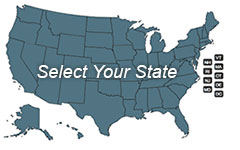Mental Health Counselor License Requirements in Maryland

Maryland mental health counselors are licensed as LCPCs. They are referred to as ‘Clinical Professional Counselors’, or simply ‘Professional Counselors’. Licensure is based on education, examination, and supervised practice. In-state counselors complete post-graduate supervised practice as LGPCs (Licensed Graduate Professional Counselors).
- Featured Online CACREP Accredited Master's in Counseling Program Options:
- Prepare for counseling licensure in as few as 27 months with Pepperdine’s online MA in Clinical Psychology - no GRE required. The program is top ranked for return on investment (ROI) by OnlineU.
- Grand Canyon University offers an M.S. in Clinical Mental Health Counseling with an Emphasis in Childhood and Adolescence Disorders; Christian Counseling; Marriage & Family Therapy and Trauma.
- Liberty University, a non-profit university, offers a CACREP accredited online Master of Arts in Clinical Mental Health Counseling. Click here to learn more about Liberty University and their Master of Arts in Clinical Mental Health Counseling.
- Southern New Hampshire University (SNHU) offers a CACREP accredited online BA in Psychology - Mental Health. Click here to learn about the counseling programs at SNHU.
- Rivier University’s online Master of Arts in Clinical Mental Health Counseling degree program offers the framework and professional training needed to start a rewarding career as a licensed clinical mental health counselor.
- Sacred Heart University offers a Clinical Mental Health Counseling Program. Click here to learn more about the Clinical Mental Health Counseling Program from Sacred Heart University
Select a Maryland Mental Health Counselor Licensure Topic:
- Licensed Clinical Professional Counselor Education Requirements
- Required Examination
- Supervision Requirements
- Application Process
- Out-of-State Candidates
- Contacts and Additional Information
Educational Requirements
Licensure is dependent on completing a master’s or doctoral degree in counseling or a related field. Minimum program length is 60 semester hour or 90 quarter hours. The program must include content in the following Board-mandated areas:
- Human growth and development
- Counseling theory
- Counseling techniques
- Social and cultural foundations of counseling
- Lifestyle and career development
- Group, dynamics, processing and counseling
- Appraisal of individuals
- Research and evaluation
- Professional, legal and ethical Responsibilities
- Diagnosis and psychopathology
- Psychotherapy and treatment of mental emotional disorders
- Marriage and family therapy
- Alcohol and drug Counseling
- Supervised field experience
Required courses may be three semester hours or five quarter hours. Courses may go by different names. The Board has provided a PDF that outlines course content and includes common course titles (http://dhmh.maryland.gov/bopc/pdfs/educationalrequirementinformationLCPCandLCPC.pdf).
Prospective applicants who are unsure if they meet Maryland’s educational requirements may pay $25 to have their coursework pre-evaluated. An unofficial transcript is acceptable at this stage. However, the graduate will need to provide course descriptions for all courses where the title does not match what’s listed in the application materials.
The Board notes that individuals whose master’s degree programs include fewer than 60 semester hours can meet licensing standards by completing additional coursework (https://health.maryland.gov/bopc/Pages/faqs.aspx).
A candidate who seeks licensure based on a doctoral degree must have at least 90 semester hours. 135 quarter hours is accepted as the equivalent.
Examination Requirements
Maryland requires national and state examinations; in-state candidates take them before they complete their supervised practice. The National Counselor Examination (NCE) covers core counseling concepts. Some students take the NCE during their final quarter or semester as graduate students. Those who do not complete the requirement at the graduate level will have the Maryland Board review their education as part of the application process. After receiving notification of eligibility, they will register with the National Board for Certified Counselors (NBCC).
Examination registration entails a $195 fee, paid directly to the NBCC. It may take four weeks from the date of fee clearance for the candidate to receive authorization to schedule an examination. Examinations are computer-delivered and are available two weeks a month at AMP (www.goAMP.com) testing sites. The examination is available in Maryland in Randallstown and in the greater Baltimore area; candidates can also schedule their examinations in other jurisdictions. A link to the examination handbook, and to state-specific examination information, can be found on the ‘Maryland’ page of the NBCC website (http://www.nbcc.org/directory/MD). The NBCC can be contacted at 336-217-4111.
The Maryland Law Test is administered twice a month at the Board office.
Supervised Practice Requirements
Counselors who hold a master’s as their highest degree are required to complete three years of supervised practice and accrue 3,000 hours. Those with doctoral degrees are required to complete two years and accrue 2,000 hours (https://health.maryland.gov/bopc/Pages/pc.aspx). Applicants at either level may credit up to 1,000 hours earned prior to the degree.
At least half of the required clinical experience is to be under the supervision of an LCPC (http://dhmh.maryland.gov/bopc/pdfs/LGPCSupervisionRequirementsRegulations.pdf). The remainder may be supervised by another qualified mental health provider.
A list of approved LCPC supervisors can be downloaded from the Board website (https://health.maryland.gov/bopc/Pages/pc.aspx). The list includes contact information for many professionals, some of whom are located in the District of Columbia or in neighboring states.
The LGPC will work under a supervision contract. A master’s level candidate will need 100 hours of post-master supervision. At least 50 must be individual. At least 1,500 of the required 3,000 hours must consist of face-to-face client contact.
The Application Process
In-state candidates apply first for a Licensed Graduate Professional Counselor (LGPC) credential; this allows them to complete post-degree supervised practice hours.
Applicants must document that their coursework met Board requirements. If course titles do not match those listed in application materials, additional documentation will be required.
Transcripts should be included in the application package in their original sealed envelopes.
The LGPC application costs $75.
The LGPC license is issued for only two years but may be renewed; graduate counselors are directed to request renewal two months before license expiration date. They will need to document continuing education and pay a $200 fee; they will also need to ensure that they don’t have unpaid state taxes.
LGPCs will fill out transfer applications when they are ready to upgrade. The application fee will again be $75.
The counselor will need three references. References may come from professional counselors or from other mental health providers. At least one must come from a post-graduate clinical supervisor.
Application materials are available online (https://health.maryland.gov/bopc/Pages/forms.aspx). They require notarization. The completed application package is to be mailed to the Board office in Baltimore.
Criminal background checks are now required. The Board will mail information.
Out-of-State Candidates
Licensing policies are modified for counselors who have licenses in good standing in other states. Such counselors may be licensed on the basis of graduate programs of less than 60 semester hours provided they have been licensed at the appropriate level for at least three years and have accrued 3,000 hours of experience (https://health.maryland.gov/bopc/Pages/pc.aspx).
The Maryland Board will not require endorsement candidates to document all coursework required of standard applicants. However, they must document coursework in the following areas: 1) psychopathology and diagnosis 2) psychotherapy and treatment and 3) professional/ legal/ ethical responsibilities. The Board may accept registration with the National Credentials Registry (NCR) of the American Association of State Counseling Boards (AASCB) in lieu of transcripts.
Either the NCE or National Clinical Mental Health Counselors Examination (NCMHCE) will be accepted.
Out-of-state licensure forms are available in Word format on the Board website (https://health.maryland.gov/bopc/Pages/pc.aspx).
Additional Information
The Maryland Board of Counselors and Therapists (https://health.maryland.gov/bopc/Pages/index.aspx) can be reached at 410-764-4732.
The Licensed Clinical Professional Counselors of Maryland (formerly known as the Maryland Mental Health Counselors Association) is an additional professional resource (http://lcpcm.org). The organization does not license professionals but does provide resources about state and federal practice issues, including TRICARE.
Find Mental Health Counselor Licensure Requirements in Your State:

Learn about becoming a Mental Health Counselor in your state:
To View Full U.S. Map Click Here.